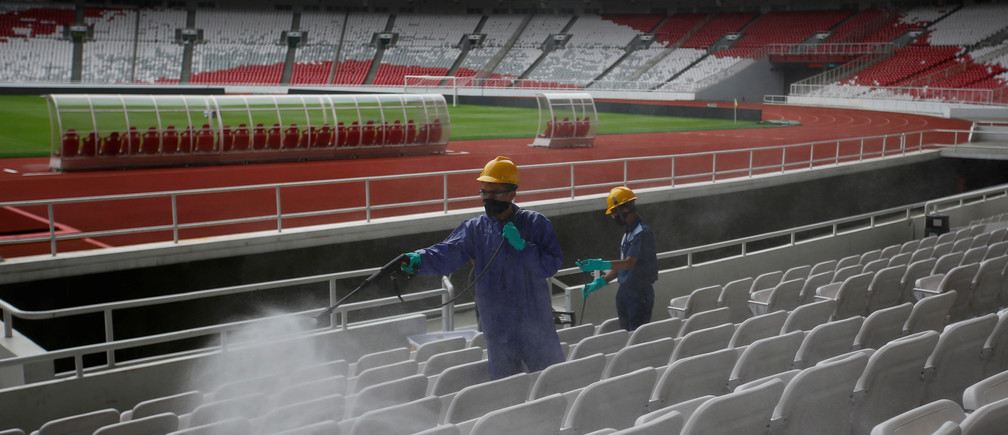Guys, I am devastated. I let you all down last year. It was right under my nose that UConn would win the championship, but I missed it due to poor data collection. I began last year's prediction by saying a team with eight losses would win March Madness, and in listing all the teams that qualified, I somehow missed...
NCAA, Sports, and Covid-19: The Ethics of Postponing
2020 has been a year of strange and unfortunate events, and the sports world has been a part of that. When things first shut down in March, we gave a perspective on why shutting down all sports was the correct call at the time. Here we are four months later with lessons learned and the immediate future of NCAA sports in the balance.

Figuratively speaking, it's time to take the L and postpone all collegiate play until there's a vaccine.
We've gone through what seemed to be three stages since the virus starting affecting the sporting world. First, was mass confusion as league after league canceled or postponed their season. Once the NCAA, notorious for putting money before the well-being of collegiate athletes, canceled March Madness, it became clear that change was coming. The second stage came as we anticipated the return of our favorite sports leagues and what that could and would potentially look. We went from thinking the NBA season could be voided, to laughing at the idea of a bubble, to celebrating the bubble once Basketball returned on Friday night. Now we are in the third stage with all eyes on collegiate sports.
A uniquely American sporting creation, collegiate sports have grown into one of the most profitable leagues in the world. Of course, the key is their refusal to pay the athletes, but that's another discussion for another day. For now, what's important to understand is that collegiate sports are at the head of talks about what happens next.

Professional leagues are back in play because they can afford models where they either isolate athletes, pay for weekly testing or a combination of both. That is simply not realistic for collegiate sports, and with no payment for these athletes, it is irresponsible to force them to assume these risks.
What I don't understand is that there's this myth out there that we can't just forego the fall season and resume play once there's a vaccine. As if not having collegiate sports for a season would cause the world to collapse on itself with no hope for a recovery.
In actual practice, it is not that bad of a prospect. For the sake of competition and giving collegiate athletes a fair opportunity, collegiate sports should be postponed until there is a vaccine. The responsible alternative is finding a way to test the 500,000 collegiate athletes every week while hopefully getting them to self-isolate and act responsibly, something that is as far-fetched as anything has ever been far-fetched.
What message is the NCAA sending if they allow sports to go on in the middle of a pandemic?

With no funding for weekly testing while simultaneously asking nearly 500,000 student-athletes to isolate themselves from the rest of campus with no guarantee that other athletes and students are doing the same and won't expose themselves and their families to the virus. Once again, it's important to note that the concern is not necessarily for the athletes themselves who are mostly in good physical condition, but for everyone else that might be affected.
Many college conferences have taken the right step and have at least postponed competition to the spring, where experts are anticipating a vaccine. The NCAA and NAIA should follow suit and make it mandatory for all sports while simultaneously retaining the eligibility of each athlete.
There is simply no responsible way to have this season without a vaccine in play. Some things are just more important than sports, and the health of the athletes and their communities falls firmly in that mix. It's one thing to ask professional athletes to participate. It is another to ask collegiate athletes, with no financial reassurance, to do the same. Don't let the NCAA fool you into thinking they just want to provide sports for the world to help deal with the pandemic. This is firmly about their profits and the TV deals they have to meet.
The decision should be waiting for a vaccine. That way collegiate athletes get a real season, we get to watch sports with no restrictions, and we don't have to live with the fact that we forced collegiate athletes into competition in the middle of a global pandemic for little more than our entertainment.
We will look back on this 3, 5, 10 years from now has nothing more than a forgotten season. Not more, not less. Things rarely matter as much in the big picture as they do at the moment. Postpone all collegiate sports until there's a vaccine.
Latest posts in our blog
Read what's new this week
Favorite Selections from 2024 NWSL Draft
Read an article covering the best picks in the 2024 NWSL draft as the league reaches new heights.
NBA Preseason Power Rankings 2023-2024
A new season is upon us, and with it comes plenty of intriguing storylines. From massive traves and superstar uncertainty in the East to a West perhaps the deepest it has ever been, here is an early season NBA Power ranking.




